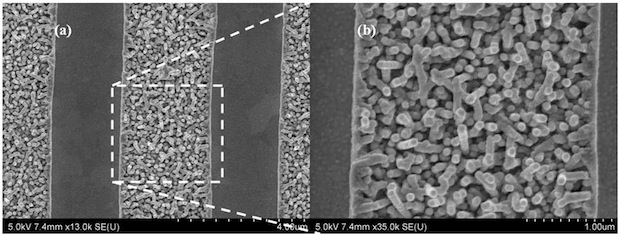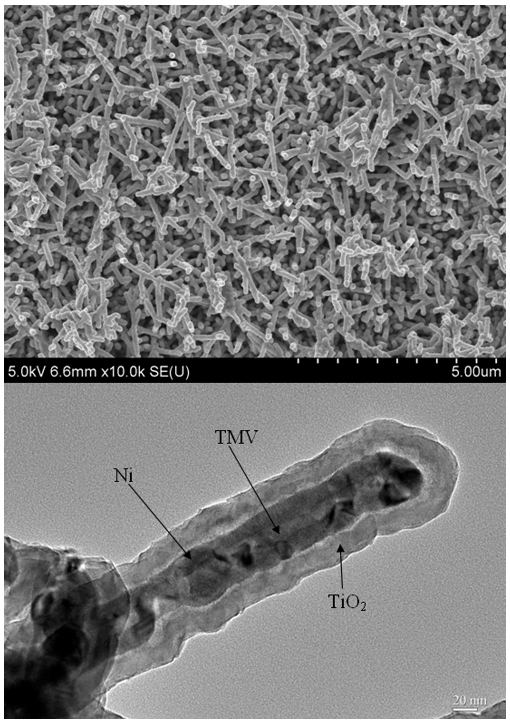The virus will help to increase the capacity of Li-ion batteries
The tobacco mosaic virus (TMV) has a bad reputation: it affects hundreds of different plants, including tomatoes, peppers, and, of course, tobacco. But his image can improve if the results of American researchers are confirmed under the guidance of Professor Reza Ghodssi .
According to scientists, rod-shaped viruses can vertically dock to the plane of the electrodes in Li-ion batteries, increasing the area of the conductor and increasing the capacity of a standard battery by a factor of ten.

')
A genetically modified virus is launched onto tobacco leaves for propagation, then it is harvested, crushed and the virus bodies are isolated in a centrifuge (an average kilogram of TMV per solution is obtained per kilogram of leaves). The modified virus is specially sharpened to stick around the gold-containing plates, which serve as templates for the subsequent manufacture of electrodes. A metal-biological mixture is obtained, the area of which is an order of magnitude larger than the area of a smooth plate.
Then a nickel coating is applied to this mixture. As seen in the last photo, the virus body is covered with a metal film approximately 20 nm thick.

The template for the battery electrode is almost ready. It remains to apply the active substance on top (usually these are lithium oxides with cobalt or manganese for the anodes) using, for example, magnetron sputtering .
The viruses in this patented design are completely isolated, so the batteries are not infectious with respect to the surrounding plants.
It is interesting that with the help of such technology it is possible to create extremely small batteries for microscopic-sized robots.
According to scientists, rod-shaped viruses can vertically dock to the plane of the electrodes in Li-ion batteries, increasing the area of the conductor and increasing the capacity of a standard battery by a factor of ten.

')
A genetically modified virus is launched onto tobacco leaves for propagation, then it is harvested, crushed and the virus bodies are isolated in a centrifuge (an average kilogram of TMV per solution is obtained per kilogram of leaves). The modified virus is specially sharpened to stick around the gold-containing plates, which serve as templates for the subsequent manufacture of electrodes. A metal-biological mixture is obtained, the area of which is an order of magnitude larger than the area of a smooth plate.
Then a nickel coating is applied to this mixture. As seen in the last photo, the virus body is covered with a metal film approximately 20 nm thick.

This is how viruses look on the plate after nickel plating
The template for the battery electrode is almost ready. It remains to apply the active substance on top (usually these are lithium oxides with cobalt or manganese for the anodes) using, for example, magnetron sputtering .
The viruses in this patented design are completely isolated, so the batteries are not infectious with respect to the surrounding plants.
It is interesting that with the help of such technology it is possible to create extremely small batteries for microscopic-sized robots.
Source: https://habr.com/ru/post/109722/
All Articles